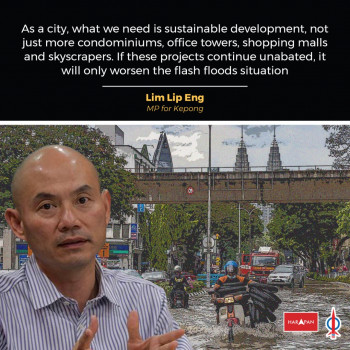by Zairil Khir Johari
If the prime minister’s strategy is to wear everyone down by keeping the whole country in constant anticipation of an election “around the corner”, then he has at least succeeded in one thing during his four years in office.
Malaysians have been waiting for the dissolution of Parliament for more than two years now. We’ve heard every prediction, every possible nomination-polling day combo, along with every corresponding rationale. In the last few weeks, dissolution rumours have intensified so much that a new one would make its rounds on a daily basis.
None has, of course, come true. Every predicted date has come and gone. Last week, we witnessed for the first time in history the automatic dissolution of a state assembly ― Negri Sembilan ― with Pahang set to go next week. Yet there is still no sign of a general election.
In any case, it really doesn’t matter anymore. Najib’s joker in the deck had always been his prerogative to call for a snap election ― and there were opportunities aplenty over the last two years when the opposition would really have been caught unprepared. However, this late into the game, the element of surprise has all but disappeared as Parliament is due to dissolve automatically at the end of this month.
Whatever Najib’s reasons are for delaying the polls, it is very clear what he intends to do in this final lead-up. In the last few weeks, the prime minister has been criss-crossing the country making announcement after announcement of gifts and goodies for nearly everyone possible.
Most notably, government servants across the board were treated to a pay rise while a salary rationalisation exercise for the armed forces and police personnel was hastily implemented and backdated to the beginning of the year. This is in addition to two other salary increments that the 1.4 million-strong civil service is due to receive this year.
Besides direct government servants, 40,000 employees of federal agencies also received good news in the form of improved perks such as a new pension fund, a provision for fixed allowances and gratuity for retirees, and the streamlining of EPF contributions.
And then we have bonuses galore for the staff of various government-linked corporations such as POS Malaysia (RM500 bonus for all employees, additional insurance coverage for their families and free laptops for their children), Telekom Malaysia (RM500 bonus for all 26,000 employees), Permodalan Nasional Berhad (an extra month’s bonus and RM1,000 in the form of unit trusts for children of employees) and Petronas (RM1,000 “token of appreciation” for all 4,000 employees).
And this is on top of the latest round of RM500 hand-outs to seven million low-income households and individuals courtesy of BR1M 2.0. I believe it is safe to say that this is the most amount of money ever spent in a single election campaign.
Unfortunately for Najib, this desperate “Santa Claus” strategy, coupled with the inordinate delay in calling for the polls, has only reinforced the perception that his government is on the verge of losing power. Everywhere from mamak shops to hotel lounges, the general consensus is that the prime minister is postponing the dissolution for fear of losing. Whether such a hypothesis has any basis or not does not matter ― the perception is a pervasively negative one.
Some rumours on the ground even go so far as to suggest that Najib is planning to suspend elections indefinitely, citing conspiracy theories revolving around the use of the Lahad Datu insurgency as a pretext for declaring a state of emergency. This is, of course, an unlikely prospect, but the fact that such whispers seem to grow louder as every day passes speaks volumes of the people’s confidence in the prime minister.
Meanwhile, it also doesn’t help that the grand old man of Malaysian politics himself has made known his own annoyance by declaring in no uncertain terms that, were he still in power, the general election would have been called last year.
To compound Najib’s predicament, this unusual delay has now descended into ridicule in the online and social media circles. Sarcastic Twitter hashtags and Facebook posts are now a dime a dozen, as everyone cannot resist making fun of the dissolution that never seems to come.
Whatever Najib’s rationale for delaying the polls may be, it cannot possibly overcome the surge of negative popular perception that has built up as a result of his indecisiveness. It has now become a running joke, and with automatic dissolution less than a month away, Najib has basically lost whatever legitimacy he has ever had, notwithstanding the fact that the he is a prime minister without his own mandate.
That said, it is worthwhile to note that this delay that we are witnessing, while unprecedented in Malaysia, is not wholly uncommon in the Westminster system on which ours is based. In the history of the British Parliament, only three times has a peacetime government left it until within a month of automatic dissolution before calling for elections.
The three governments in question were those of Alec Douglas-Home, John Major and, more recently, Gordon Brown. All three cases saw embattled prime ministers who inherited governments in decline after prolonged stints in power (three terms in the case of Douglas-Home’s and Gordon Brown’s governments, and four in the case of Major’s). All three elections ended in defeat for the incumbents.
The lesson to be learnt from the British experience is that dragging an expired and besieged government into polls does not usually end favourably. Especially when the electorate has been dragged along for too long.
So when will the thirteenth general election be? It really doesn’t matter anymore.
___________________________
* This article first appeared on The Malaysian Insider and the views expressed are the personal opinion of the columnist.



